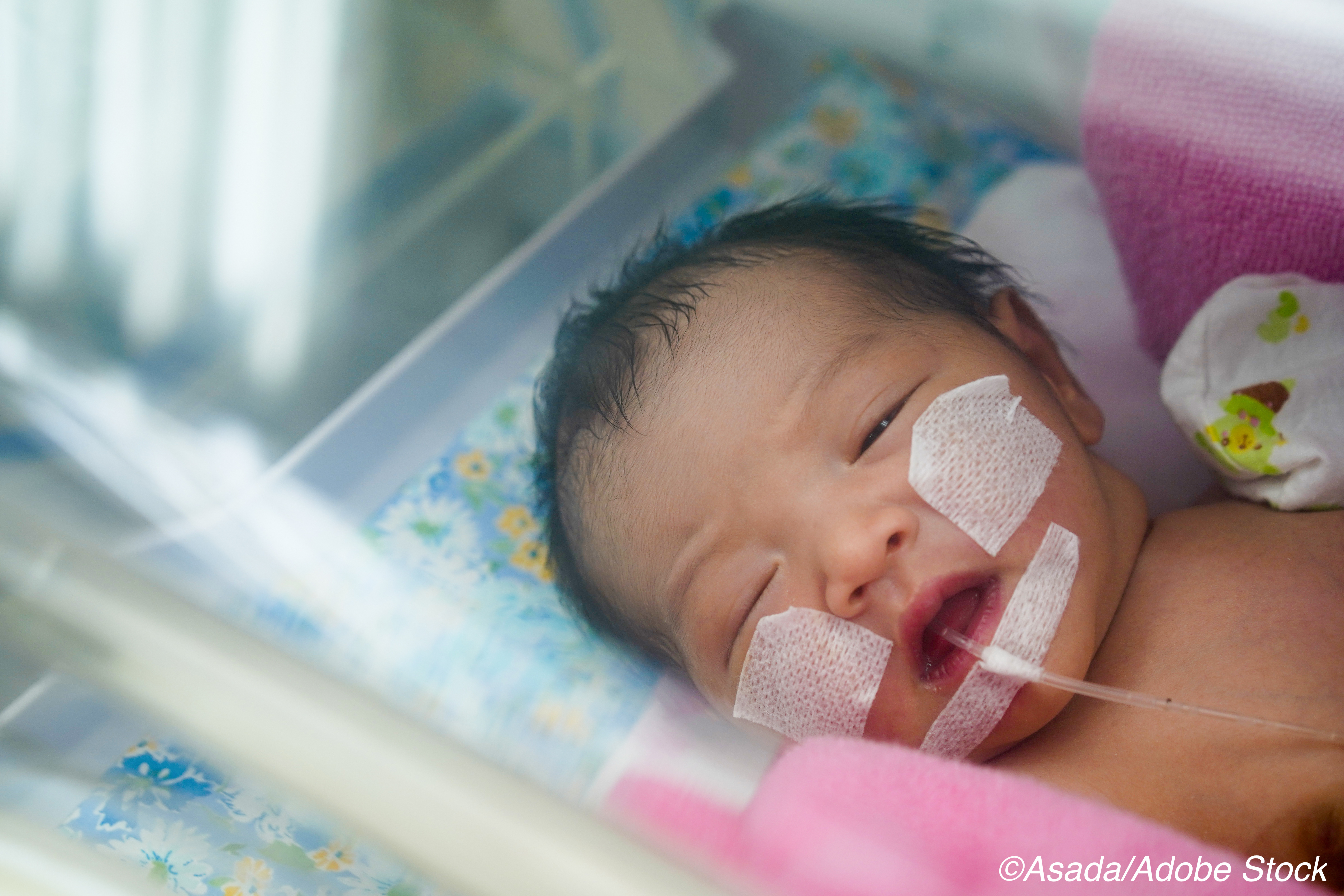 There was no clinical evidence of vertical transmission of SARS-CoV-2 from mothers to newborns, researchers reported.
There was no clinical evidence of vertical transmission of SARS-CoV-2 from mothers to newborns, researchers reported.
In 101 infants born to mothers positive with — or suspected of having — the virus, there was no detection of SARS-CoV-2 viral RNA in 95.7% of tests, and only two had indeterminate test results that were indicative of low viral load (2.0%, 95% CI 0.2% to 7.0%), according to Cynthia Gyamfi-Bannerman, MD, MSc, from Columbia University Irving Medical Center in New York City, and co-authors.
Of those two, “1 newborn never underwent retesting but remained well on follow-up, and the other had negative results on retesting,” they reported in JAMA Pediatrics.
Also, 55 newborns were tracked in a Covid-19 Newborn Follow-up Clinic at days of life 3 and 10 and “remained well,” they wrote, adding that the results were found despite the babies rooming-in with mothers and direct breastfeeding (91 breastfed partially; 41 breastfed exclusively or mostly).
“We herein present, to our knowledge, the largest series of newborns born to mothers positive for or with suspected SARS-CoV-2 infection to date and show low rates of testing-based vertical or perinatal transmission and no clinical evidence for neonatal SARS-CoV-2 infection,” they wrote.
“These data are particularly reassuring given that we describe mothers with a range of clinical presentations,” the authors noted.
But they also cited several study limitations, including the fact that findings from a pandemic epicenter (NYC) may not be generalizable to other areas. Also, the cohort consisted entirely of women infected in their third trimester, with most at term, and most of the newborns did not undergo retesting for the virus.
In an editorial accompanying the study, David W. Kimberlin, MD, of the University of Alabama at Birmingham, and Karen M. Pupolo, MD, PhD, of the University of Pennsylvania Perelman School of Medicine in Philadelphia, also suggested caution when interpreting the results.
“The very low risk of postnatal infection should additionally be placed in the context of maternal/newborn physical separation that occurred for different reasons in 25 cases (24.8%) and the very careful infection control practices used in the other 75.2% of cases, at least during the birth hospitalization, as well as missing post-discharge follow-up for a significant proportion of the newborns,” they stated.
Kimberlin and Pupolo also pointed out that “Early in the pandemic, initial recommendations for management of newborns delivered to mothers with Covid-19 were deliberately conservative… it was initially recommended that mothers with Covid-19 be temporarily physically separated from their newborns to decrease the risk of neonatal infection.”
Given the current findings, “Acquisition of SARS-CoV-2 from infected mothers at delivery appears to be infrequent, and the risk of severe illness among newborns who are infected in the perinatal or immediate postnatal period appears infrequent as well,” they said.
Gyamfi-Bannerman’s group conducted a retrospective cohort analysis in 54 girls and 47 boys born to 100 mothers positive for or with suspected SARS-CoV-2 infection at New York-Presbyterian Morgan Stanley Children’s Hospital or New York-Presbyterian Allen Hospital from mid-March to late April 2020. The women ranged in age from their mid-20s to late 30s; the majority were Hispanic and had a BMI ranging from about 28 to >30 kg/m2.
Covid-19 in the mothers was classified as asymptomatic/mildly symptomatic versus severe/critical, and newborn characteristics and clinical courses were compared across maternal Covid-19 severity.
Virus testing for mothers and newborns was done via nasopharyngeal swab specimens, and the study’s primary outcome was newborn SARS-CoV-2 testing results.
Tests were obtained from 15 newborns within their first 24 hours of life, from 79 newborns between 24 and 48 hours post-birth, and from seven newborns at day ≥2 of life.
Mothers classified with severe/critical Covid-19 were associated with newborns born approximately 1 week earlier (median gestational age 37.9 versus 39.1 weeks, P=0.02) and at increased risk of requiring phototherapy (30% versus 7%, P=0.04) compared with newborns of mothers with asymptomatic/mild Covid-19, the authors reported.
The 10 mothers with severe/critical Covid-19 did not transmit SARS-CoV-2 to their newborns, they found.
The authors also followed up 55 of the newborns at a median 6 days of life and reported that 26 had regained or surpassed their birth weight, 29 remained below birth weight by a mean of 4.3%, and no newborn had excessive weight loss. No other issues were identified, they said.
“This study endorses the benefits of rooming-in, establishing breastfeeding, and delaying bathing on newborn outcomes and suggests that separating mothers positive for SARSCoV-2 and their newborns and avoiding direct breastfeeding may not be warranted to prevent SARS-CoV-2 transmission,” they concluded.
- The risk of vertical transmission of SARS-CoV-2 from mother to newborn was low (2% positive test results), and no infant had clinical evidence of Covid-19, according to a study done in New York City hospitals.
- The results were found despite the babies rooming-in with mothers and direct breastfeeding, so separating mothers positive for SARS-CoV-2 and their newborns, and avoiding direct breastfeeding, may not be warranted to prevent SARS-CoV-2 transmission.
Shalmali Pal, Contributing Writer, BreakingMED™
Gyamfi-Bannerman reported support from the Eunice Kennedy Shriver National Institute of Child Health and Human Development. Co-authors reported relationships with UpToDate, Medicolegal, Merck for Mothers, Merck, and GigaGen.
Kimberlin reported serving as a member of the American Academy of Pediatrics (AAP) Committee on Infectious Diseases and the writing group for AAP Neonatal Covid guidance. Puopolo reported serving as a member of the AAP Committee on Fetus and Newborn and the writing group for the AAP Neonatal Covid guidance.
Cat ID: 41
Topic ID: 83,41,190,926,41,138,192,927,151,928,925,934

